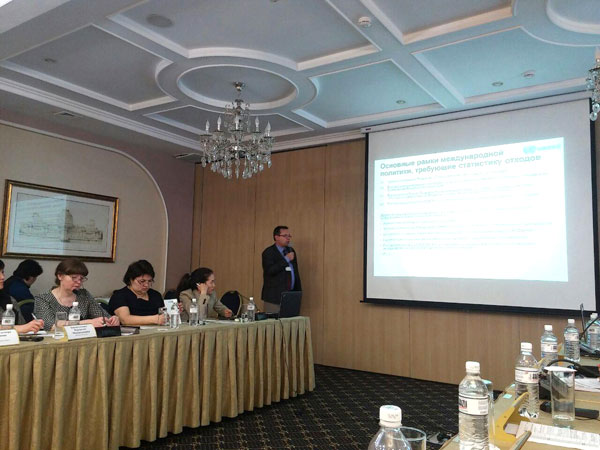WORKSHOP “ENVIRONMENT AND SDG INDICATORS”
On April 25-28, 2017, a workshop “Environment and SDG indicators” was held under the UNEP and UNECE joint projects on the development of the Shared Environmental Information System (SEIS) and on statistics on SDGs in Almaty.
The event was organized by the United Nations Environment Program (UNEP) in partnership with the United Nations Economic Commission for Europe (UNECE).
The representatives of statistical and environment agencies of the Republic of Kazakhstan (including territorial branches of the Committee on Statistics at the Ministry of National Economy), Kyrgyz Republic, and Republic of Tajikistan took part in the workshop. International organizations were represented by UNEP, UNECE, and SIC ICWC.

The workshop was aimed at shaping a common understanding on environment statistics in the EU countries, studying the experience of Kazakhstan in the development of environment statistics, exchanging opinions on the development of the environment statistics system and contribution of statistics to the Sustainable Development Goals (SDG).
The event was focused on two topics – statistics on water resources and waste.
According to the Agenda, the following general issues were discussed during the workshop:
- United Nations Framework for the development of environment statistics. Basic principles for the development of environment statistics;
- Introduction into the System of Environmental-Economic Accounting (SEEA);
- Environment statistics in the Republic of Kazakhstan;
- SDG indicators relevant for monitoring the environmental dimension of the SDGs;
- Implementation of the Shared Environmental Information System (SEIS): environmental information scorecard and electronic version of SoE report;
- Preliminary discussion on data flows needs for future reporting on SDGs;
- Opportunities and challenges in environmental data collection and data processing in support of the SDGs.
The following issues related to statistics on water resources were considered:
- Water-related information needs. International concepts on water statistics;
- International data book related to statistics on water resources, water abstraction and use;
- Surface and groundwater in the Republic of Kazakhstan;
- Collection, use and disposal of surface water in the Republic of Kazakhstan. Used methodologies and classifications;
- Data on the quality of drinking water for centralized water supply facilities by sanitary-chemical and microbiological indicators in the Republic of Kazakhstan;
- UNSD/UNEP Questionnaire 2016 on Environment Statistics: Identification of national data for the section “Water”.
The following issues related to waste statistics were considered:
- Regional prospects for waste management in Central Asia;
- Waste-related information needs, challenges and guidance on waste statistics;
- Industrial and hazardous waste in Kazakhstan. Used methodologies and classifications;
- UNSD/UNEP Questionnaire 2016 on Environment Statistics: Identification of national data for the section “Waste”.
In general, European experience in the development of environment statistics was presented in the course of the workshop. Statistical reporting forms used in Kazakhstan were considered. International experts drafted recommendations to further improve the development of statistical indicators in the Republic of Kazakhstan.
Presentations by UNECE experts are available at www.unece.org/index.php?id=45655#/
|